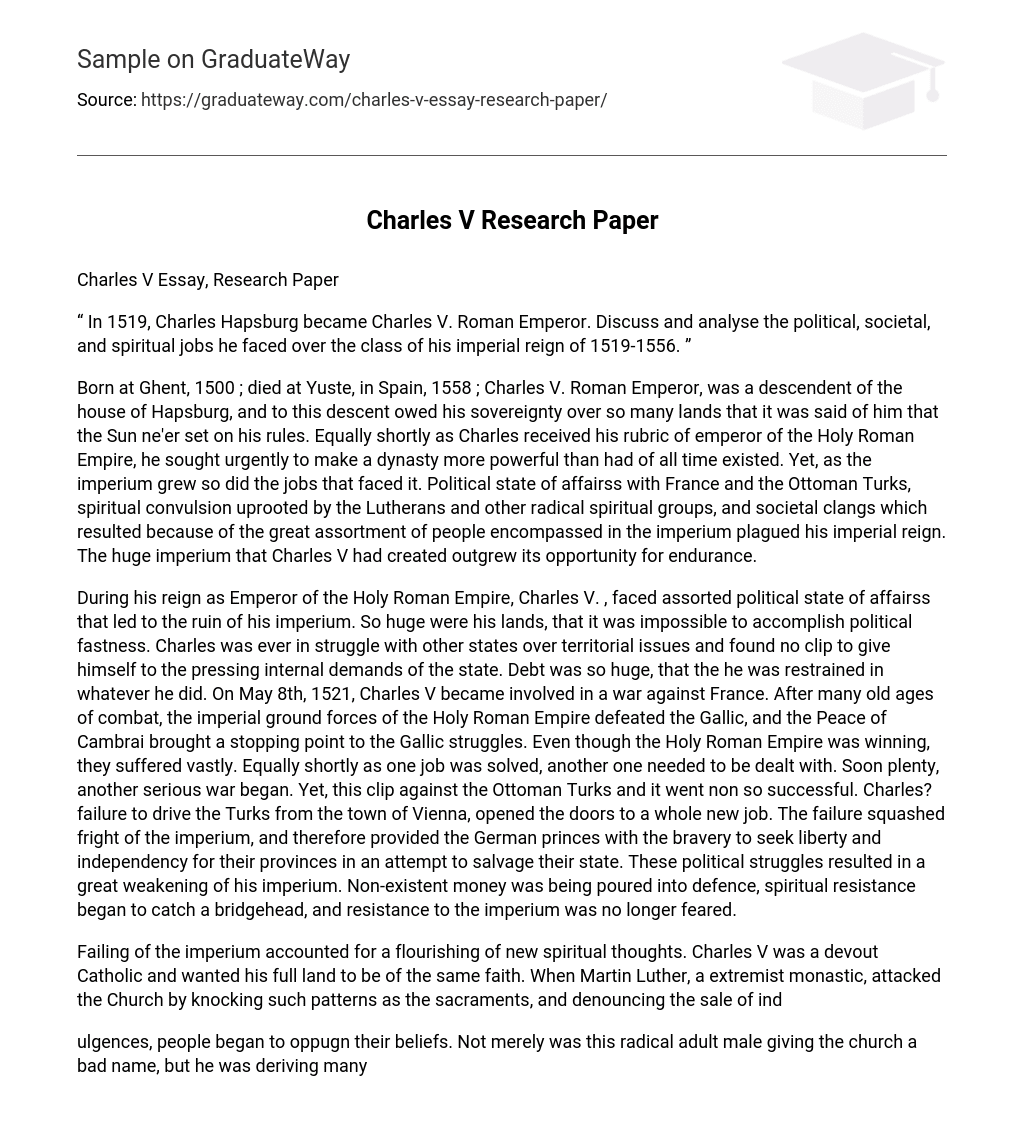Charles V Essay, Research Paper
“ In 1519, Charles Hapsburg became Charles V. Roman Emperor. Discuss and analyse the political, societal, and spiritual jobs he faced over the class of his imperial reign of 1519-1556. ”
Born at Ghent, 1500 ; died at Yuste, in Spain, 1558 ; Charles V. Roman Emperor, was a descendent of the house of Hapsburg, and to this descent owed his sovereignty over so many lands that it was said of him that the Sun ne’er set on his rules. Equally shortly as Charles received his rubric of emperor of the Holy Roman Empire, he sought urgently to make a dynasty more powerful than had of all time existed. Yet, as the imperium grew so did the jobs that faced it. Political state of affairss with France and the Ottoman Turks, spiritual convulsion uprooted by the Lutherans and other radical spiritual groups, and societal clangs which resulted because of the great assortment of people encompassed in the imperium plagued his imperial reign. The huge imperium that Charles V had created outgrew its opportunity for endurance.
During his reign as Emperor of the Holy Roman Empire, Charles V. , faced assorted political state of affairss that led to the ruin of his imperium. So huge were his lands, that it was impossible to accomplish political fastness. Charles was ever in struggle with other states over territorial issues and found no clip to give himself to the pressing internal demands of the state. Debt was so huge, that the he was restrained in whatever he did. On May 8th, 1521, Charles V became involved in a war against France. After many old ages of combat, the imperial ground forces of the Holy Roman Empire defeated the Gallic, and the Peace of Cambrai brought a stopping point to the Gallic struggles. Even though the Holy Roman Empire was winning, they suffered vastly. Equally shortly as one job was solved, another one needed to be dealt with. Soon plenty, another serious war began. Yet, this clip against the Ottoman Turks and it went non so successful. Charles? failure to drive the Turks from the town of Vienna, opened the doors to a whole new job. The failure squashed fright of the imperium, and therefore provided the German princes with the bravery to seek liberty and independency for their provinces in an attempt to salvage their state. These political struggles resulted in a great weakening of his imperium. Non-existent money was being poured into defence, spiritual resistance began to catch a bridgehead, and resistance to the imperium was no longer feared.
Failing of the imperium accounted for a flourishing of new spiritual thoughts. Charles V was a devout Catholic and wanted his full land to be of the same faith. When Martin Luther, a extremist monastic, attacked the Church by knocking such patterns as the sacraments, and denouncing the sale of ind
ulgences, people began to oppugn their beliefs. Not merely was this radical adult male giving the church a bad name, but he was deriving many adherents every bit good. Among the followings of Luther were many princes. At the Diet of Worms, the pontificate’s secular representative, Charles V, summoned the monastic to deny his spiritual beliefs. Luther refused and was to be arrested under the orders of Charles, but alternatively was protected by a German prince. These Lutheran German princes began to withstand the Emperor and addition independency. Some of the princes were true in their beliefs of Lutheranism, nevertheless most were moved by stuff involvements. They could now impound the church’s retentions, and could flash their independency from Charles. In the undermentioned old ages, the Lutheran princes proclaimed their support of the instructions of Lutheranism through the Augsburg Confession. Following the confession, Charles instantly declared war on the Lutheran princes and won a oppressing licking in 1547. Yet, the motion was excessively big, and one loss did non give up their hopes. Finally, Charles could make no more, and in 1555 gave in to the Lutherans and compromised. Known as the Diet of Augsburg, this pact allowed each prince to find the faith of his district. It was going obvious that Charles was unable to command his huge imperium. Even his ain topics were get downing to turn against him.
Socially, the imperium was so diverse that integrity was non possible. Difference in imposts and beliefs could non merely be forgotten. Lack of a authorities that could fulfill the different groups of people accounted for Charles? loss of power. A premier illustration was that of the German princes. As they chose their ain faith, many began to float farther off from the power of Charles V. The metropoliss became really independent, and refused to stay insubordinate to a cardinal authorities. It was impossible to keep control under these conditions. Therefore, Charles was steadily losing power to his insubordinate princes.
Charles? dream of a superior incorporate imperium was ne’er fulfilled. The huge sums of land did non let for an efficient signifier of authorities. Constant warfare distracted Charles and gave him small clip to go to to other concerns. While he was contending a war, a new job would be brewing. Besides, the extended combat caused for a mammoth debt. Religious rebellions added much to the whole job. Subjects turned against Charles and once more contributed to the weakening of the imperium. The societal state of affairs besides did non make much to assist integrity. The immense diverseness of people contained in the imperium about wholly ruled out the opportunity for integrity. In the terminal, the imperial reign of Charles V. , the Roman emperor, left the Roman imperium in a province of great disunity that would ne’er be restored.





